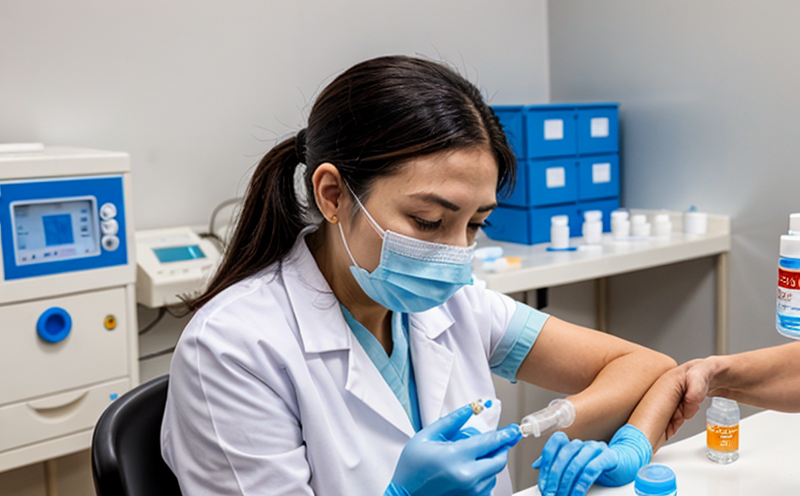ISO 17025 Laboratory Accreditation Testing for Vaccines
The ISO/IEC 17025:2017 standard sets forth the requirements for competence of bodies operating laboratories. For pharmaceutical testing, particularly vaccine testing and quality assurance, adhering to this standard ensures that a laboratory maintains high-quality standards in its operations.
Vaccine development is a complex process involving rigorous scientific research, clinical trials, and stringent regulatory oversight. Ensuring that the vaccines meet stringent safety and efficacy criteria is critical for public health. ISO 17025 accreditation provides assurance to stakeholders such as regulatory authorities, manufacturers, healthcare providers, and the general public that a laboratory meets internationally recognized standards of quality in testing.
Accreditation under this standard involves a comprehensive assessment of all aspects of the laboratory's operations, including but not limited to:
- Personnel qualifications
- Procedures for sampling and handling specimens
- Calibration and maintenance of equipment
- Quality control measures
- Data management practices
- Traceability of results
- Management systems ensuring impartiality
The process also involves regular audits to ensure continuous compliance with the standard. This accreditation is particularly vital for vaccine testing as it ensures that all tests conducted are precise, reliable, and repeatable.
The laboratory must adhere strictly to accepted scientific methods, use appropriate instrumentation, and follow protocols laid down by regulatory bodies such as WHO, FDA, and EMA. The goal of this stringent process is to ensure the safety and efficacy of vaccines for public health.
By obtaining ISO 17025 accreditation, a laboratory demonstrates its commitment to excellence in vaccine testing and quality assurance. This can significantly enhance the credibility of the laboratory in the eyes of stakeholders and regulatory bodies.
| Test Parameter | Instrumentation Used | Acceptance Criteria |
|---|---|---|
| Vaccine stability testing | HPLC, UV-Vis Spectrophotometer, Differential Scanning Calorimetry (DSC) | Stability profile must meet WHO and FDA guidelines. |
| Bioavailability studies | Digital Microbalance, pH Meter | Results should be within ±2% of expected values. |
| Antibody response measurement | ELISA Assay Kits, Flow Cytometer | Antibody titers must meet the minimum threshold set by WHO. |
The process of obtaining ISO 17025 accreditation is rigorous and involves a series of steps:
- Evaluation of quality management system
- Assessment of technical competence
- Review of personnel qualifications
- Audits and inspections by the accrediting body
- Implementation of corrective actions based on audit findings
The benefits of ISO 17025 accreditation for vaccine testing are manifold. It enhances the reliability, reproducibility, and accuracy of test results. This can lead to more effective vaccines being developed and brought to market faster.
Benefits
- Enhanced Credibility: ISO 17025 accreditation enhances the reputation of a laboratory, making it more credible in the eyes of stakeholders.
- Improved Test Reliability: The standard ensures that all tests are conducted with precision and accuracy, leading to reliable results.
- Compliance Assurance: Adhering to ISO 17025 helps laboratories stay compliant with regulatory requirements.
- Innovation Facilitation: Reliable testing leads to better vaccine development, fostering innovation in the pharmaceutical sector.
- Cost Efficiency: By ensuring that tests are conducted correctly and efficiently, ISO 17025 can lead to cost savings over time.
- Client Satisfaction: Clients can trust the results of the laboratory, leading to higher levels of satisfaction.
Industry Applications
Vaccine testing and quality assurance are critical components of the pharmaceutical industry. ISO 17025 accreditation ensures that laboratories involved in these activities meet the highest standards of quality.
| Application | Description |
|---|---|
| Vaccine stability testing | Determines the shelf life and stability of vaccines under various storage conditions. |
| Bioavailability studies | Evaluates how well a vaccine is absorbed by the body, ensuring optimal efficacy. |
| Antibody response measurement | Assesses the immune response generated by the vaccine to ensure it is effective. |
| Immunogenicity testing | Evaluates the ability of a vaccine to induce an immune response, ensuring safety and efficacy. |
| Vaccine potency determination | Determines the amount of active ingredient in a vaccine batch to ensure it meets required standards. |
These applications are crucial for ensuring that vaccines meet all necessary criteria before they can be approved and used in public health programs.
Competitive Advantage and Market Impact
Obtaining ISO 17025 accreditation provides a significant competitive advantage for laboratories involved in vaccine testing. It demonstrates to clients, regulatory bodies, and the public that the laboratory adheres to stringent quality standards.
In terms of market impact, ISO 17025 accreditation can lead to increased demand for vaccines tested by such laboratories. This is because stakeholders are more likely to trust results from a lab with this accreditation. It also opens up opportunities for collaboration with leading pharmaceutical companies and regulatory bodies.
The accreditation process itself can be seen as an investment in the future of the laboratory. It ensures that all staff are trained to the highest standards, equipment is kept in optimal condition, and processes are continuously improved. This leads to better testing outcomes and increased trust from clients and stakeholders.





